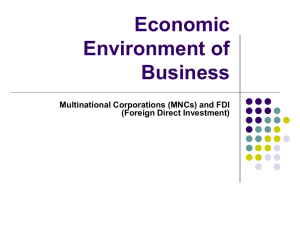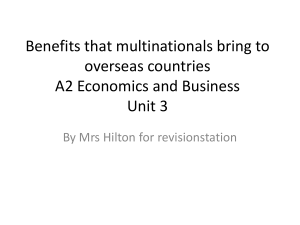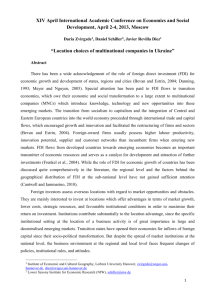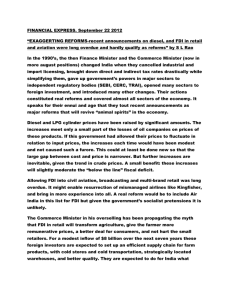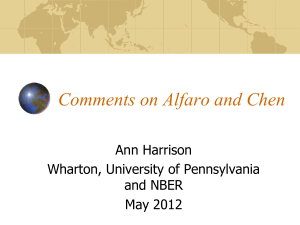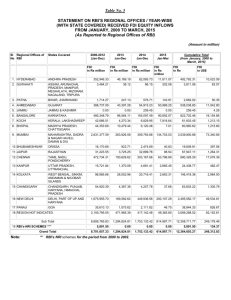File - Mr. P. Ronan
advertisement
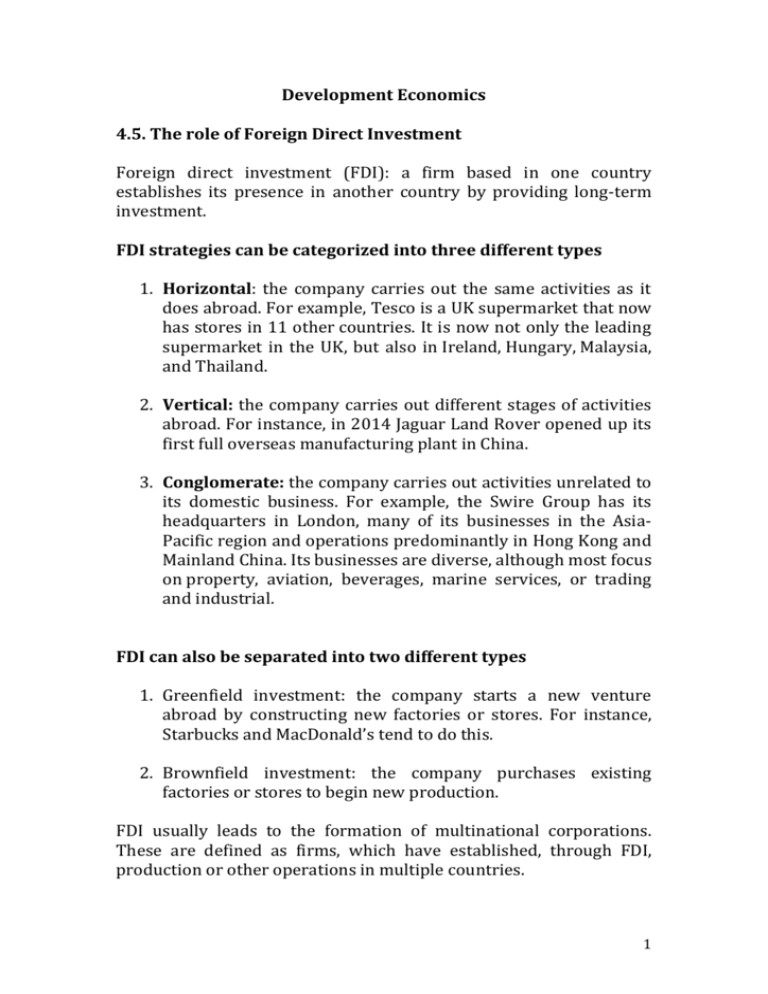
Development Economics 4.5. The role of Foreign Direct Investment Foreign direct investment (FDI): a firm based in one country establishes its presence in another country by providing long-term investment. FDI strategies can be categorized into three different types 1. Horizontal: the company carries out the same activities as it does abroad. For example, Tesco is a UK supermarket that now has stores in 11 other countries. It is now not only the leading supermarket in the UK, but also in Ireland, Hungary, Malaysia, and Thailand. 2. Vertical: the company carries out different stages of activities abroad. For instance, in 2014 Jaguar Land Rover opened up its first full overseas manufacturing plant in China. 3. Conglomerate: the company carries out activities unrelated to its domestic business. For example, the Swire Group has its headquarters in London, many of its businesses in the AsiaPacific region and operations predominantly in Hong Kong and Mainland China. Its businesses are diverse, although most focus on property, aviation, beverages, marine services, or trading and industrial. FDI can also be separated into two different types 1. Greenfield investment: the company starts a new venture abroad by constructing new factories or stores. For instance, Starbucks and MacDonald’s tend to do this. 2. Brownfield investment: the company purchases existing factories or stores to begin new production. FDI usually leads to the formation of multinational corporations. These are defined as firms, which have established, through FDI, production or other operations in multiple countries. 1 Ultimately MNCs expand into economically less developed countries in order to either increase their sales or to reduce their costs, and therefore increase their profit margins. Here are some more detailed reasons for MNCs expanding abroad... 1 Natural resources are only available for extraction from certain locations; therefore, it may be more feasible to have refineries nearby, such as for oil and copper. 2 Labour costs are often lower in developing countries, so MNCs employ workers in these countries in an attempt to lower production costs. Developing countries tend to have slacker regulatory framework, meaning that there are fewer restrictions on business activities. This gives greater freedom to MNCs and can with lowering costs of production. For example, laws concerning environmental safeguarding may not be as well enforce, thereby giving firms more choice of where to set up factories. These are the characteristics that developing countries tend to have which attract FDI: 3 Low cost factor inputs, including low labour costs and natural resources. 4 A regulatory framework that favours profit repatriation. 5 Favourable tax rules as firms generally prefer to pay lower taxes as then more of their revenue can be kept as profit. 6 Stable macroeconomic environment and political as this gives MNCs greater certainty that they will profit from their investments. 7 Weak regulatory system and environmental laws. 8 Weak trade unions; as it is easier to hire and fire workers. Also these would otherwise give workers greater power to bid up wages. 9 Cultural similarities, perhaps due to proximity or former colonies. 10 Plentiful natural resources 11 High levels of labour productivity and human capital 12 High quality infrastructure, including roads and ports 2 Advantages of MNCs • Increases employment opportunities for locals • Improves the productivity of the workforce by providing training and education • Increases the speed of the transfer and diffusion of technology • Adds to the investment that domestic savings finance • Corrects a current account deficit as the investment is an initial inflow and the MNCs products may generate a flow of export earning • Increases tax revenues which can then be spent by the government to aid growth and development Disadvantages of MNCs • They may import intermediate goods rather than domestic suppliers • They may become a monopoly, therefore eradicating competition from domestic producers • Repatriation of profits and payments of royalties may led to outward flows of foreign exchange and worsen the balance of payments • Tax concessions may mean that tax revenues collected from MNCs are substantially less than they should be • If MNCs use capital intensive technologies, rather than labour intensive, then fewer job opportunities may be created than expected • They may bring workers from their own country, instead of employing locals • The job opportunities may be low skilled and without training, so the workforce will not improve their skills • MNCs may worsen the unequal income distribution, by only providing job opportunities in urban areas • The goods and services produced by the MNC may be of no interest or use to local consumers. China in Africa: investment or exploitation? https://www.youtube.com/watch?v=poPWsFGmKos Source: http://ibstudy.wix.com/ibeconomics#!45-the-role-offoreign-direct-investmen/c1ri7, accessed Tuesday November 10th 2015 3 FDI and its effect on developing countries FDI and growth Beyond the initial macroeconomic stimulus from the actual investment, FDI influences growth by raising total factor productivity and, more generally, the efficiency of resource use in the recipient economy. This works through three channels: the linkages between FDI and foreign trade flows, the spillovers and other externalities vis-à-vis the host country business sector, and the direct impact on structural factors in the host economy. Trade and investment While the empirical evidence of FDI’s effects on host-country foreign trade differs significantly across countries and economic sectors, a consensus is nevertheless emerging that the FDI-trade linkage must be seen in a broader context than the direct impact of investment on imports and exports. The main trade-related benefit of FDI for developing countries lies in its long-term contribution to integrating the host economy more closely into the world economy in a process likely to include higher imports as well as exports. In other words, trade and investment are increasingly recognized as mutually reinforcing channels for cross-border activities. However, host-country authorities need to consider the short and medium-term impacts of FDI on foreign trade as well, particularly when faced with current-account pressures, and they sometimes have to face the question of whether some of the foreignowned enterprises’ transactions with their mother companies could diminish foreign reserves. Technology transfers Economic literature identifies technology transfers as perhaps the most important channel through which foreign corporate presence may produce positive externalities in the host developing economy. MNEs are the developed world’s most important source of corporate research and development (R&D) activity, and they generally possess a higher level of technology than is available in developing countries, so they have the potential to generate considerable technological spillovers. However, whether and to what extent MNEs facilitate such spillovers varies according to context and sectors. 4 Human capital enhancement The major impact of FDI on human capital in developing countries appears to be indirect, occurring not principally through the efforts of MNEs, but rather from government policies seeking to attract FDI via enhanced human capital. Once individuals are employed by MNE subsidiaries, their human capital may be enhanced further through training and on-the-job learning. Those subsidiaries may also have a positive influence on human capital enhancement in other enterprises with which they develop links, including suppliers. Such enhancement can have further effects as that labour moves to other firms and as some employees become entrepreneurs. Thus, the issue of human capital development is intimately related with other, broader development issues. Competition FDI and the presence of MNEs may exert a significant influence on competition in host-country markets. However, since there is no commonly accepted way of measuring the degree of competition in a given market, few firm conclusions may be drawn from empirical evidence. The presence of foreign enterprises may greatly assist economic development by spurring domestic competition and thereby leading eventually to higher productivity, lower prices and more efficient resource allocation. Conversely, the entry of MNEs also tends to raise the levels of concentration in host-country markets, which can hurt competition. This risk is exacerbated by any of several factors: if the host country constitutes a separate geographic market, the barriers to entry are high, the host country is small, the entrant has an important international market position, or the host-country competition law framework is weak or weakly enforced. Enterprise development FDI has the potential significantly to spur enterprise development in host countries. The direct impact on the targeted enterprise includes the achievement of synergies within the acquiring MNE, efforts to raise efficiency and reduce costs in the targeted enterprise, and the development of new activities. In addition, efficiency gains may occur in unrelated enterprises through demonstration effects and other spillovers akin to those that lead to technology and human capital spillovers. Available evidence points to a significant improvement in economic efficiency in enterprises acquired by MNEs, albeit to degrees that vary by country and sector. The strongest evidence of improvement is found in industries with economies of scale. Here, the submersion of an individual 5 enterprise into a larger corporate entity generally gives rise to important efficiency gains. FDI and environmental and social concerns FDI has the potential to bring social and environmental benefits to host economies through the dissemination of good practices and technologies within MNEs, and through their subsequent spillovers to domestic enterprises. There is a risk, however, that foreign-owned enterprises could use FDI to “export” production no longer approved in their home countries. In this case, and especially where host-country authorities are keen to attract FDI, there would be a risk of a lowering or a freezing of regulatory standards. In fact, there is little empirical evidence to support the risk scenario. Conclusion: benefits and costs The main policy conclusion that can be drawn from the study is that the economic benefits of FDI are real, but they do not accrue automatically. To reap the maximum benefits from foreign corporate presence a healthy enabling environment for business is paramount, which encourages domes- tic as well as foreign investment, provides incentives for innovation and improvements of skills and contributes to a competitive corporate climate. Policy recommendations Policies matter for reaping the full benefits of FDI. Foreign investors are influenced by three broad groups of factors: the expected profit- ability of individual projects; the ease with which subsidiaries’ operations in a given country can be integrated in the investor’s global strategies; and the overall quality of the host country’s enabling environment. Some important parameters that may limit expected profitability (e.g. local market size and geographical location) are largely outside the influence of policy makers. Moreover, in many cases the profitability of individual investment projects in developing countries may be at least as high as elsewhere. Conversely, developed economies retain clear advantages in the second and third factors mentioned above, which should induce less advanced economies to undertake pol- icy action to catch up. Important factors such as the host country’s infrastructure, its integration into the world trade systems and the availability of relevant national competences are all priority areas. Source: http://www.oecd.org/investment/investmentfordevelopment/1959815.pdf 6 Examination Questions 1: 7 8 2: 9 10 3: 11 12


